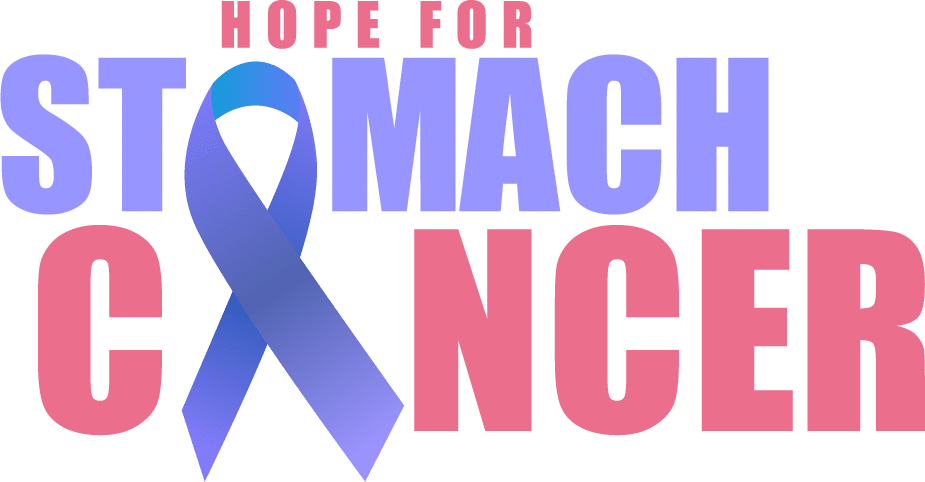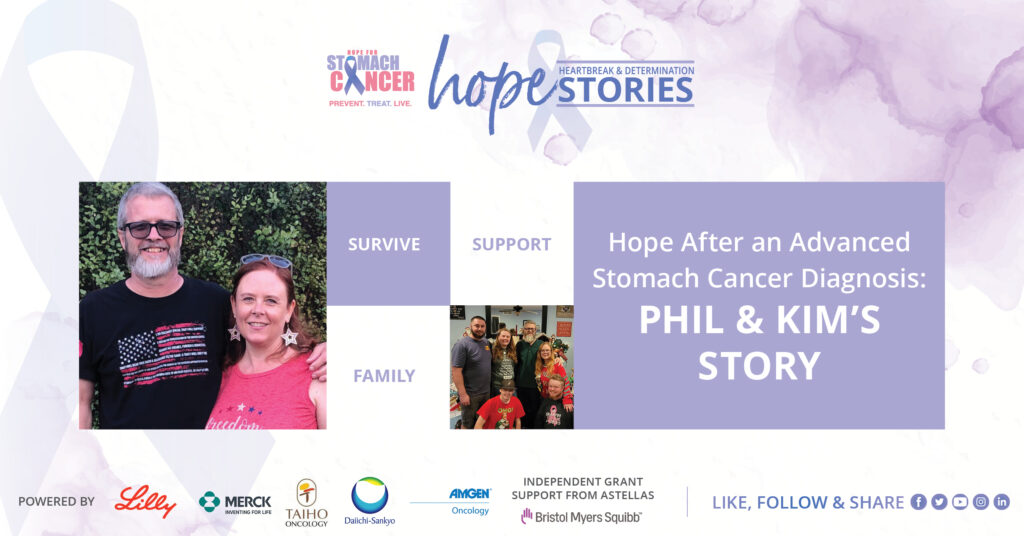Hope For Stomach Cancer recently got acquainted with Phillip (Phil) Lago, a survivor from Torrance, CA who had an advanced stomach cancer diagnosis. He and his wife Kimberly (Kim) reflect on the importance of maintaining hope and relying on faith while fighting this disease together.
Q: Thank you both so much for being willing to share your story with us. Phil, can you tell me a bit about yourself and take me back to when you received your advanced gastric cancer diagnosis?
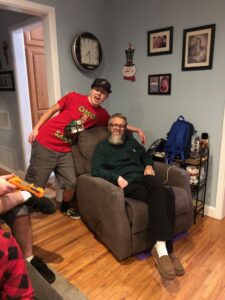 A: Yes, my wife Kim and I live in Torrance, CA and we have three children together – two boys and one girl. Kim and I met when we were teenagers and have been married for 25 years now.
A: Yes, my wife Kim and I live in Torrance, CA and we have three children together – two boys and one girl. Kim and I met when we were teenagers and have been married for 25 years now.
I began having some odd digestive problems in 2021 as I entered my late forties. I was having difficulty swallowing, and eating felt like a burden. Like most people, I turned to my primary doctor first for help. This doctor referred me to an ENT specialist, and then they turned me over to a GI doctor for a more thorough investigation.
I received an endoscopy that revealed I had advanced gastric cancer. Initially, the doctor thought I was at stage three, and suggested I join a UCLA trial for a stomach cancer treatment. After signing up for the trial and preparing in various ways to participate, I met with my surgeon, who gave me some shocking news. He advised against joining the trial, informed me that my cancer was actually at stage four, and said that my tumors were inoperable due to my advanced diagnosis.
Of course, Kim and I were blindsided by the news. Any stomach cancer diagnosis is devastating, but we were especially upset to learn that I was at stage four. The average life expectancy for a person with this diagnosis was two years. Naturally, my mind filled with questions about the future and my heart felt heavy with concern for my wife and kids.
Q: It would truly be shocking and saddening to receive news like that. What did your doctors prescribe as your treatments given your advanced diagnosis?
A: At first, we’d expected that I’d have surgery to remove the cancer. But this wasn’t the case since I was already at stage four. From a doctor’s perspective, they don’t want to expose patients to the risks of surgery if they can’t remove 100 percent of the cancer. Since this wouldn’t be possible in my case, an aggressive course of non-surgical treatments was my only hope.
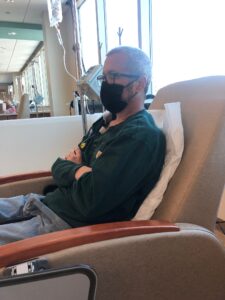
HER2 Positive, Starting Treatments and Managing Advanced Stomach Cancer At Home
As doctors probed further into my medical condition, they discovered that I was HER2 positive. A HER2-positive diagnosis is often associated with breast cancer, but it’s a factor with stomach cancer as well. The elevated levels of the protein HER2 in the cancer cells meant that my cancer could grow more rapidly. Therefore, it would need to be treated differently as well.
I was eligible to take Herceptin, a medication that blocks the receptors in HER2 cells from receiving chemical signals that make them grow. In addition to Herceptin, my doctor put me on cisplatin. I received a port and did a number of treatments at an infusion center. He also started me on Xeloda, which I will need to take indefinitely. I had a stent placed in my esophagus as well to help with eating and to prevent my esophagus from closing completely.
At home, I used a feeding tube to receive nutrients. I was hooked up to a pump for 16 hours a day as part of my treatment. This was a challenging time for our family – we were constantly trying to figure out what I could consume through my feeding pump since my options were limited. I remember Kim telling me that she had a breakdown in the store because it was such a challenge to manage my nutrition needs. She worked tirelessly to ensure that I got the nutrients I so desperately needed.
In early 2022, I got very sick from the treatments. It was an uncertain time – I was bedridden, couldn’t keep anything down, and I felt extremely weak in general. We relied heavily on faith during this period. Thankfully, I pulled through.
Coming off of Cisplatin and Trying Alternative Treatments
It’s worth mentioning that in addition to my doctor-prescribed treatments, I was using high-dose CBD on the side to help manage my symptoms. I had great success with this. I feel like some of the miraculous improvements we saw can be attributed to using CBD.
Additionally, the spiritual journey that I began early in my treatment was instrumental in helping me fight this disease. My wife’s cousin came over and provided lots of encouragement through The Bible. This led to me accepting Christ. I then decided to go to my daughter’s church, where everyone had been praying for me. Mid-service, the pastor stopped his sermon and the entire congregation came over and placed their hands on me and prayed. This moment filled me with a sense of hope and peace. Leaning on the Church and God throughout my treatment lifted my spirits and lead to my healing.
Unlike many cancer patients, we did not know how much treatment I would need because of my advanced stomach cancer diagnosis. Remarkably, after 10 treatments, we discovered that my tumors had stopped growing! We were thrilled.
Despite the improvements, I still had challenges. During my treatment, I got an infection leading to my feeding tube sliding out of place and into my stomach muscle. At the ER, the doctors decided to remove the feeding tube. Originally, the doctors told me I would live with a feeding tube forever. I was then able to tolerate more foods without nausea.
This was a big milestone in my recovery from advanced stomach cancer. At first, I could only eat liquids and soft foods. My esophageal opening was the same diameter as a straw.
But the miracles kept coming. Within a month of having the feeding tube removed, I went in for another endoscopy. Everything was looking good, so the doctor authorized the removal of my stent. A scan also revealed that I was cancer-free apart from one small growth. We couldn’t believe the news – I was a stage four success story!
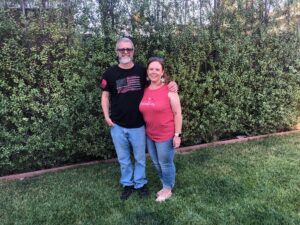
Q: Wow, what an amazing story! Congratulations on being cancer-free. Kim, I’d love to hear a bit about what it was like for you as a caregiver during this experience. Can you please share your perspective on that?
A (Kim): Caring for someone you love who has an advanced stomach cancer diagnosis is a major challenge. Above all, we learned that working as a family is essential for beating this disease. My son, who is 16, learned how to care for his dad at home and use his feeding tube. My middle son stepped in to oversee Phil’s business operations while he was in treatment, and my daughter provided invaluable emotional support.
Staying positive through stomach cancer can be immensely challenging, but having an optimistic outlook is essential for progress.
Q: Thank you both for sharing this incredible story. Can you please tell me what your hope is?
A: We hope that research will uncover some kind of cure that can help everyone. It would be great if there were options apart from removing a person’s stomach since that type of treatment is so invasive and life-changing.
Personally, we hope that sharing this story will bring encouragement to anyone who is fighting gastric cancer, whether they’ve just received an advanced stomach cancer diagnosis or they’re at stage 1. There is always hope for the future!
